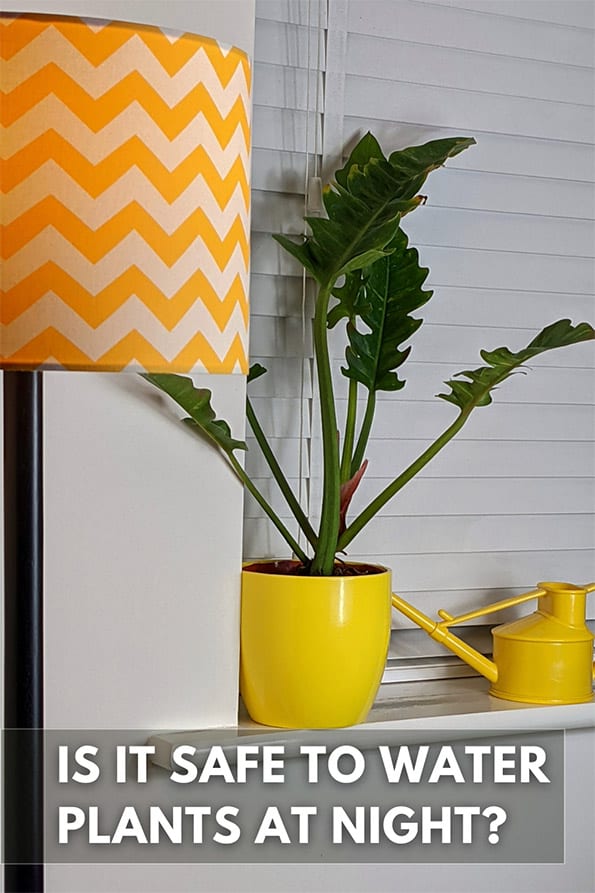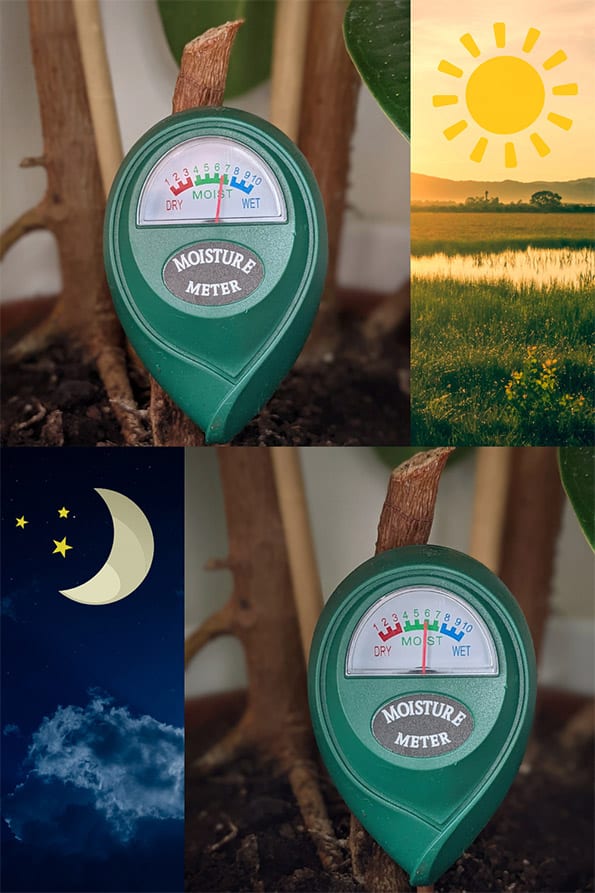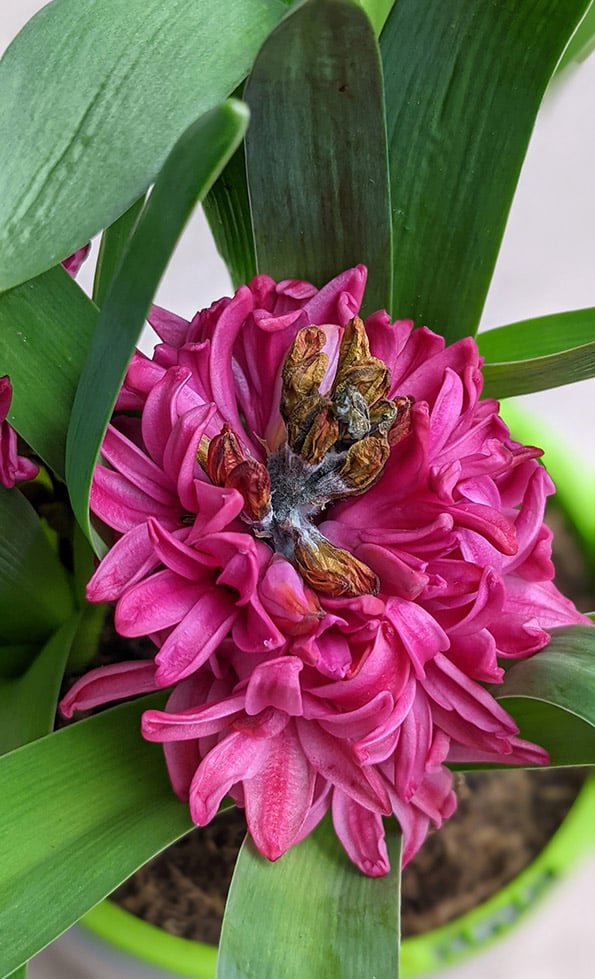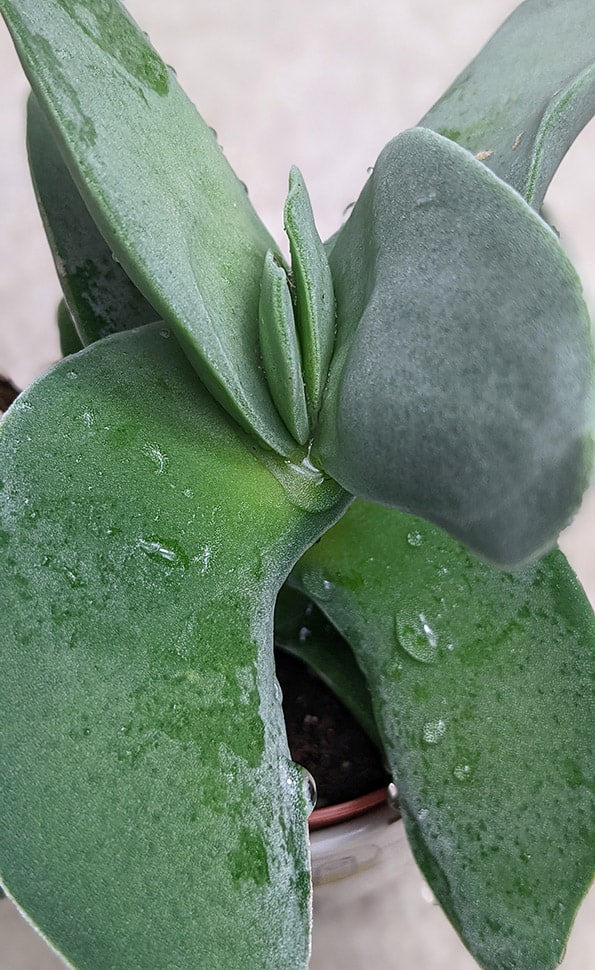There is usually no "worst time" to water your houseplants (or outdoor plants). If your plant needs water, it needs water. It's absolutely fine to water your plants at night, and in some cases, it could actually be a good thing.
There are some exclusions to this rule and a truckload of misinformation about this topic. I'm covering it all in this article and dismantling some unbelievable stuff I've read.
Is it bad to water your indoor plants at night? Is there a best time of day to do it? Early morning, late afternoon perhaps? This post aims to dig into the issues and find out.
I've owned and had houseplant experience spanning well over two decades. I love my plants and try to take good care of them, but, like you, I also have a busy life away from them.
I'll water my indoor plants when I can, and on occasion, this might be just before bed. And guess what? Nothing terrible has ever happened by doing this.

Hi, I'm Tom!
If you're like me and enjoy the challenge of growing houseplants and getting them to thrive, then Ourhouseplants can help. This website shares my knowledge and years of growing plants and provides (hopefully) helpful advice on properly caring for your indoor plant friends.
What is the harm in watering plants at night?
Below are the top reasons and conclusions people come to when they tell you watering your houseplants late in the evening is a bad idea. After each one, I'll let you know why what they're saying is rubbish.
Reason 1 - "If you water the plant at night, it won’t absorb the water, leading to disease."
This one just demonstrates a misunderstanding about how potting mediums work. When it comes to moisture, a potting medium's function is to absorb water and store it for the plant's roots to access.
Think of a potting medium like a battery. We're not talking about a phone battery that might only last until the evening before it needs charging. But instead a super heavy duty one that lasts almost a week.
Your plant doesn't absorb all the water as soon as you water it. Like charging a battery, it's the potting medium that absorbs and holds onto water. This will deplete over time as the plant pulls the water into its roots.
But, like the heavy duty battery, this can take days, maybe even a week for the potting medium to dry out or "run out of power". That's 7 day/night cycles.
Using the logic for this argument, that would mean 7 nights of the roots being exposed to water and 7 nights of possible disease!
This entire argument could only make sense if potting mediums watered in the morning are thoroughly dried out by nighttime. This just doesn't happen with houseplants.
Here's what I mean using an example:
My Rubber Plant had an early morning watering around the base of the plant to make sure the entire root system was well watered. Then I measured late evening to check the moisture levels.
After a good watering first thing in the morning at around 7 am, the meter shows just under "7" on the scale. At 10 pm that evening, it's around "6". The potting medium is still clearly moist, just like it was in the morning.
Reason 2 - "At night there’s no light so the water won't evaporate and the plant won't use it for photosynthesis".
This reason has two points based on actual science. But it's still wrong.
Dealing with evaporation first. It's true that direct sunlight warms areas and triggers evaporation from the soil surface, so evaporation doesn't tend to happen very much at night.
But it might not happen very much in the daytime either.
It's not sunny everywhere in your home and in many countries it's not sunny every day of the year. Do either of those factors cause issues? Should we only ever water houseplants when it's a sunny day and we can count on the heat of the sun?
No of course not. We know as plant parents that in lower light conditions and when it's colder, it takes far longer for the potting medium to dry out between waterings. We adjust for this by reducing the frequency that we water.
Additionally, this argument is based on the premise that a damp soil surface is bad, but I don't see it this way. Providing there is at least basic ventilation and the soil surface doesn't stay damp indefinitely (let plants dry out a bit between waterings), most houseplants are perfectly adapted to dealing with this.
In fact, with less water being lost through evaporation, it just means the growing medium stays damp for longer and that's less watering I need to do.
The second point that was made is about photosynthesis, which does need water to work.
Generally speaking, many houseplants "shut up shop" at night. Tiny holes in the leaf surface, called stomata, close and this stops the roots from pulling up water into the leaves.
The plant still uses small amounts of water throughout the night and some transpiration still occurs. However, I agree that much less water will be used during nighttime. So the science behind this point is correct.
But why is this being made out to be a problem issue and something to avoid?
All that happens in this situation is that the potting medium is nice and damp, ready for the morning. As soon as that morning light enters your home, the plant is ready to get back to work using all that lovely water you gave it the night before.
If this suggestion were valid, night rainfall would utterly destroy our gardens.
Reason 3 - "Watering indoor potted plants at night causes root rot".
This is a massive misunderstanding about what causes root rot. It's not when you water that causes it. It's actually how much and how often you do it. The time of day is irrelevant.
Root rot happens over a prolonged period (usually days, sometimes weeks) of the roots being submerged or surrounded by too much water. For container plants, too much excess water around the root zone can create the perfect environment for serious damage to occur.
But, at the end of the day, if you drastically overwater your plant in the morning, it will get root rot. If you drastically overwater at night, your plants will get root rot.
If you water your plant correctly in the morning it will be fine.
If you water it correctly at night, guess what happens?
Nothing! Your plant will be fine because the roots aren't waterlogged.
Reason 4 - "Wet leaves and damp soil increases the chances that fungus, powdery mildew and mold will grow and infect the plants".
Prolonged damp conditions will often cause these nasties to grow, yes. But they won't colonise overnight as is being implied here. I feel like this reasoning is just misinformation at its worse.
This hyacinth has rotting flowers with a noticeable fungus present. But it was not caused by watering at night. Instead, it was triggered by high humidity levels, poor light and overwatering.
When it comes to a watering schedule for garden plants, many gardeners will say they think the early morning is best. And that mindset has transitioned to indoor plants too.
But there is no good science to show that this wisdom is actually correct. Or rather there is no compelling science that indicates plants have a preference for being watered in the morning instead of the evening.
Most plants will use most water during daylight hours. It's also true that most plants do not use a great deal of water during the night. But studies have shown plants often do use water and still transpire at night.
Other research has suggested that plants that have access to water overnight can help them to grow by lowering stress and shock.
So how does that apply to growing indoor plants?
Don't get too hung up on this.
Relatively speaking, houseplants grow very slowly even at the best of times. These studies are finding ways to maximize growth. Most people aren't racing their indoor plants or seeking this level of efficiency.
Well, essentially, if you go to bed and your plants have access to water then they could still grow a little. They will also be fully prepared and have water in the right places to resume photosynthesis and energy generation as soon as the sun rises.
On the flip side, if you hadn't watered your thirsty houseplant before bed and instead decided to wait until the morning, it would have to wait for you to wake up and give it water. It would then take more time for the plant to draw that water into its cells. Essentially, in this example, hours have been wasted.
If you're still looking for a little reassurance, know that if the following two conditions are met, an evening watering is going to be "the lowest of the low" risk for your houseplants.
Alright, so you're the uber careful plant parent and you want to be in that "zero risk" camp. In that case, this is when I would tell you to avoid night time watering and to only do it in the morning.
Water pooling like this could theoretically attract fungus and bacteria to the damp leaves, which can be made worse by cooler temperatures over night. You could avoid this entirely by bottom watering instead.
The worst time to water houseplants is....
... When they've fully dried out and have started to wilt and look faded. This is extreme dehydration for most plants, all the water from the potting soil has gone and the the plant itself is on the edge.
During hot weather this could mean the end of your plant if you don't catch it soon enough.
It's actually a good time to water of course. Providing a good soaking now, no matter the time of the day could bring it back to life. But it's letting your plant get to that state that makes this situation bad.
The takeaway from this, and the article in general, is that houseplants can be watered at any time of the day. Whether it's morning, noon or night. Basically whenever you notice they need it doing (or you remember and are around to do it).
And I stand by my view that if you meet the "rules" talked about already, then it's perfectly safe to water your plants at night.



